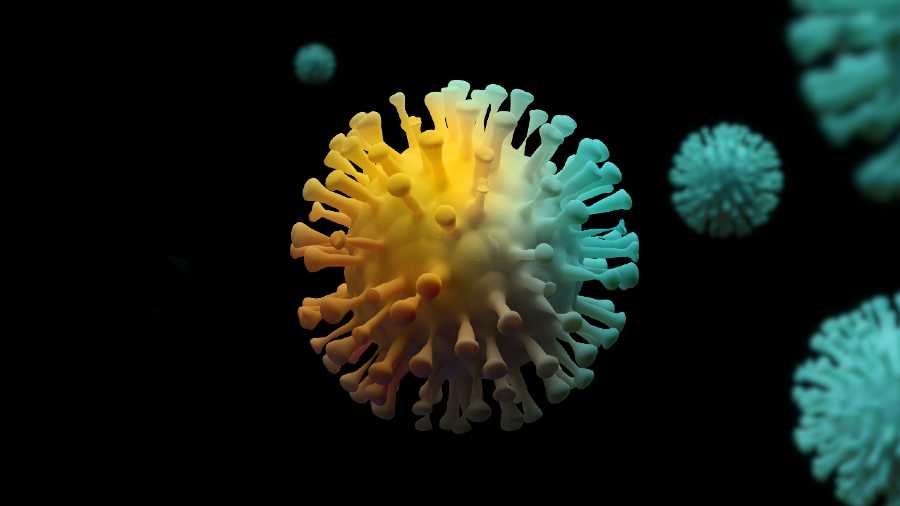South Africa, the global epicentre of an outbreak of the new highly contagious Omicron Covid-19 variant, says it’s bracing for what could be the country’s fourth pandemic wave amid a big rise in coronavirus cases, including young children.
Officials of the Tshwane Metropolitan Municipality, which includes the heavily affected Gauteng Province, reported that between November 14 and 28, the highest number of hospital admissions were for children under 2 years of age. Some 10 per cent of admissions were for those in the under two age group, though it is not yet known if they were suffering from the highly contagious Omicron variant.
So far, there have been no reports of any case of Omicron in India but Karnataka’s health ministry said the sample of one person who returned recently from South Africa was “different from the Delta variant” and that it was now undergoing further analysis.
Dr Samiran Panda, epidemiology chief at the Indian Council of Medical Research, said he would not be surprised if Omicron was already in India. "It is possibly already in India and it may be a matter of time before it's detected."
"The first case (of Omicron) was reported (in Botswana) on November 9 and there has been a lot of travel since then from South Africa," Panda told NDTV. "I won't be surprised if there's detection in India. It's just a matter of time, given the high transmissibility that this variant comes with," he added. So far, the variant has been reported in at least 15 countries from the UK to Australia.
Dr Waasila Jassat of South Africa’s National Institute for Communicable Diseases, said the highest risk of hospital admissions was still in the over 65 age group. The percentage in the middle age group was low, while data shows that it was "very" high in young children,” she said.
Still, Jassat said it was unclear so far how many admissions involved the new variant or whether Omicron caused more severe illness. What was evident, she said, was that most admissions were unvaccinated people. “What we can see across the country is that there's a much higher risk of death amongst those that are unvaccinated," she told an online briefing.
Jassat said the high percentage of young children being admitted may be due to caution on the part of parents. She noted that they also have an immune system that is not fully developed and they are also unvaccinated, putting them more in danger.
So far most of the Omicron cases in South Africa have been mild to moderate but doctors stress that it is early days to understand the effects of the virus which was only reported to The World Health Organization on November 24. Health experts reckon it will take at least two weeks to understand how serious the effects of the variant may be.
South Africa’s fresh infection tally stood at 2,800 Sunday, up from a daily average of 500 in the previous week. Epidemiologists say they expect the daily case toll to reach 10,000 by the weekend.
India’s Civil Aviation Minister Jyotiraditya Scindia said that the government is closely watching the Omicron situation as it develops around the world in light of India’s plans to resume scheduled international passengers services in mid-December. Austria, Canada, France, Germany, Italy, the Netherlands have already halted flights from southern Africa in a bid to slow the spread of the variant which has some 50 mutations, the most of any Covid-19 strain, making it more contagious.
Results from international travellers who have tested positive are being sent for genomic analysis. Genomic sequencing is also being carried out on the positive test result of a Maharashtra merchant navy engineer who just returned from South Africa and is in isolation.
The Delhi state government has ordered RT-PCR tests for all travellers arriving from high-risk' countries, genome sequencing of positive cases and mandatory isolation.”
Immunologist Satyajit Rath said he believed that the highly mutated variant would “turn out to be very good at spreading, it will likely not cause more severe disease.” Existing vaccines “will probably show some reduction in their potency against Omicron but will not be ineffective' and current drugs will quite likely work well against it,” Rath told The Press Trust of India.
Panda said India was well prepared to deal with Omicron, noting the government has set up the INSACOG laboratory network across India to monitor genomic variations in the SARS-CoV-2. "They are adept at identifying the variants responsible for the infection," he said.
While Britain, the US and other countries are administering booster Covid-19 shots, Panda said that the “first priority must be to cover as many people as possible with double vaccinations first.”










